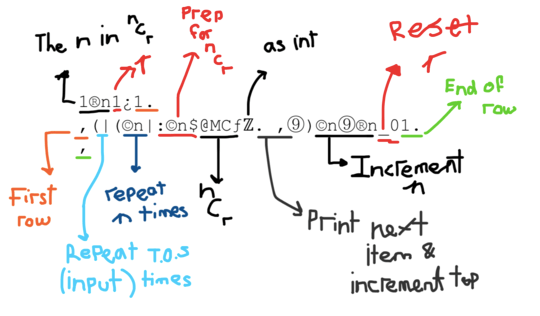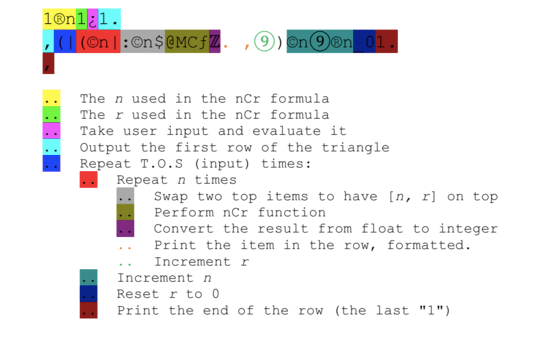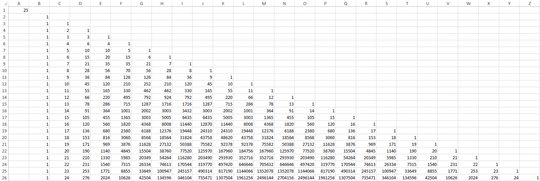Malbolge Unshackled (20-trit rotation variant), 3,2485e7 bytes
Size of this answer exceeds maximum postable program size (eh), so the code is located in my GitHub repository.
It's a slow monstrosity, but I love this one. The digits are being displayed in hexadecimal form.
Btw, the code is compressed using 7Zip and PPMd algorithm, because the program is plain too big to post to Github in it's state of art.
How to run this?
This might be a tricky part, because naive Haskell interpreter will take ages upon ages to run this. TIO has decent Malbogle Unshackled interpreter, but sadly I won't be able to use it (limitations).
The best one I could find is the fixed 20-trit rotation width variant, that performs very well.
To make the interpreter a bit faster, I've removed all the checks from Matthias Lutter's Malbolge Unshackled interpreter.
My modified version can run around 6,3% faster.
#include <malloc.h>
#include <stdio.h>
#include <stdlib.h>
#include <string.h>
const char* translation = "5z]&gqtyfr$(we4{WP)H-Zn,[%\\3dL+Q;>U!pJS72Fh"
"OA1CB6v^=I_0/8|jsb9m<.TVac`uY*MK'X~xDl}REokN:#?G\"i@";
typedef struct Word {
unsigned int area;
unsigned int high;
unsigned int low;
} Word;
void word2string(Word w, char* s, int min_length) {
if (!s) return;
if (min_length < 1) min_length = 1;
if (min_length > 20) min_length = 20;
s[0] = (w.area%3) + '0';
s[1] = 't';
char tmp[20];
int i;
for (i=0;i<10;i++) {
tmp[19-i] = (w.low % 3) + '0';
w.low /= 3;
}
for (i=0;i<10;i++) {
tmp[9-i] = (w.high % 3) + '0';
w.high /= 3;
}
i = 0;
while (tmp[i] == s[0] && i < 20 - min_length) i++;
int j = 2;
while (i < 20) {
s[j] = tmp[i];
i++;
j++;
}
s[j] = 0;
}
unsigned int crazy_low(unsigned int a, unsigned int d){
unsigned int crz[] = {1,0,0,1,0,2,2,2,1};
int position = 0;
unsigned int output = 0;
while (position < 10){
unsigned int i = a%3;
unsigned int j = d%3;
unsigned int out = crz[i+3*j];
unsigned int multiple = 1;
int k;
for (k=0;k<position;k++)
multiple *= 3;
output += multiple*out;
a /= 3;
d /= 3;
position++;
}
return output;
}
Word zero() {
Word result = {0, 0, 0};
return result;
}
Word increment(Word d) {
d.low++;
if (d.low >= 59049) {
d.low = 0;
d.high++;
if (d.high >= 59049) {
fprintf(stderr,"error: overflow\n");
exit(1);
}
}
return d;
}
Word decrement(Word d) {
if (d.low == 0) {
d.low = 59048;
d.high--;
}else{
d.low--;
}
return d;
}
Word crazy(Word a, Word d){
Word output;
unsigned int crz[] = {1,0,0,1,0,2,2,2,1};
output.area = crz[a.area+3*d.area];
output.high = crazy_low(a.high, d.high);
output.low = crazy_low(a.low, d.low);
return output;
}
Word rotate_r(Word d){
unsigned int carry_h = d.high%3;
unsigned int carry_l = d.low%3;
d.high = 19683 * carry_l + d.high / 3;
d.low = 19683 * carry_h + d.low / 3;
return d;
}
// last_initialized: if set, use to fill newly generated memory with preinitial values...
Word* ptr_to(Word** mem[], Word d, unsigned int last_initialized) {
if ((mem[d.area])[d.high]) {
return &(((mem[d.area])[d.high])[d.low]);
}
(mem[d.area])[d.high] = (Word*)malloc(59049 * sizeof(Word));
if (!(mem[d.area])[d.high]) {
fprintf(stderr,"error: out of memory.\n");
exit(1);
}
if (last_initialized) {
Word repitition[6];
repitition[(last_initialized-1) % 6] =
((mem[0])[(last_initialized-1) / 59049])
[(last_initialized-1) % 59049];
repitition[(last_initialized) % 6] =
((mem[0])[last_initialized / 59049])
[last_initialized % 59049];
unsigned int i;
for (i=0;i<6;i++) {
repitition[(last_initialized+1+i) % 6] =
crazy(repitition[(last_initialized+i) % 6],
repitition[(last_initialized-1+i) % 6]);
}
unsigned int offset = (59049*d.high) % 6;
i = 0;
while (1){
((mem[d.area])[d.high])[i] = repitition[(i+offset)%6];
if (i == 59048) {
break;
}
i++;
}
}
return &(((mem[d.area])[d.high])[d.low]);
}
unsigned int get_instruction(Word** mem[], Word c,
unsigned int last_initialized,
int ignore_invalid) {
Word* instr = ptr_to(mem, c, last_initialized);
unsigned int instruction = instr->low;
instruction = (instruction+c.low + 59049 * c.high
+ (c.area==1?52:(c.area==2?10:0)))%94;
return instruction;
}
int main(int argc, char* argv[]) {
Word** memory[3];
int i,j;
for (i=0; i<3; i++) {
memory[i] = (Word**)malloc(59049 * sizeof(Word*));
if (!memory) {
fprintf(stderr,"not enough memory.\n");
return 1;
}
for (j=0; j<59049; j++) {
(memory[i])[j] = 0;
}
}
Word a, c, d;
unsigned int result;
FILE* file;
if (argc < 2) {
// read program code from STDIN
file = stdin;
}else{
file = fopen(argv[1],"rb");
}
if (file == NULL) {
fprintf(stderr, "File not found: %s\n",argv[1]);
return 1;
}
a = zero();
c = zero();
d = zero();
result = 0;
while (!feof(file)){
unsigned int instr;
Word* cell = ptr_to(memory, d, 0);
(*cell) = zero();
result = fread(&cell->low,1,1,file);
if (result > 1)
return 1;
if (result == 0 || cell->low == 0x1a || cell->low == 0x04)
break;
instr = (cell->low + d.low + 59049*d.high)%94;
if (cell->low == ' ' || cell->low == '\t' || cell->low == '\r'
|| cell->low == '\n');
else if (cell->low >= 33 && cell->low < 127 &&
(instr == 4 || instr == 5 || instr == 23 || instr == 39
|| instr == 40 || instr == 62 || instr == 68
|| instr == 81)) {
d = increment(d);
}
}
if (file != stdin) {
fclose(file);
}
unsigned int last_initialized = 0;
while (1){
*ptr_to(memory, d, 0) = crazy(*ptr_to(memory, decrement(d), 0),
*ptr_to(memory, decrement(decrement(d)), 0));
last_initialized = d.low + 59049*d.high;
if (d.low == 59048) {
break;
}
d = increment(d);
}
d = zero();
unsigned int step = 0;
while (1) {
unsigned int instruction = get_instruction(memory, c,
last_initialized, 0);
step++;
switch (instruction){
case 4:
c = *ptr_to(memory,d,last_initialized);
break;
case 5:
if (!a.area) {
printf("%c",(char)(a.low + 59049*a.high));
}else if (a.area == 2 && a.low == 59047
&& a.high == 59048) {
printf("\n");
}
break;
case 23:
a = zero();
a.low = getchar();
if (a.low == EOF) {
a.low = 59048;
a.high = 59048;
a.area = 2;
}else if (a.low == '\n'){
a.low = 59047;
a.high = 59048;
a.area = 2;
}
break;
case 39:
a = (*ptr_to(memory,d,last_initialized)
= rotate_r(*ptr_to(memory,d,last_initialized)));
break;
case 40:
d = *ptr_to(memory,d,last_initialized);
break;
case 62:
a = (*ptr_to(memory,d,last_initialized)
= crazy(a, *ptr_to(memory,d,last_initialized)));
break;
case 81:
return 0;
case 68:
default:
break;
}
Word* mem_c = ptr_to(memory, c, last_initialized);
mem_c->low = translation[mem_c->low - 33];
c = increment(c);
d = increment(d);
}
return 0;
}
It's working (very slowly!)





@PeterOlson Will there ever be an accepted answer to this question? – Gaffi – 2012-06-08T03:59:54.027
4@Gaffi Probably not, accepting an answer makes me feel like I'm ending the contest and discouraging new and possibly better answers. – Peter Olson – 2012-06-08T04:05:46.117
NB In a sense this is a simplified version of Distributing the balls
– Peter Taylor – 2011-10-21T11:03:31.367@Peter Olson: What's your opinion of ratchet freak's interpretation of "you may format it however you like"? If I followed his interpretation I could shave 18 characters. – Steven Rumbalski – 2011-10-21T20:57:51.890
@StevenRumbalski He's fine. There's a newline between each row, and there is a space between each number, so it meets the criteria. – Peter Olson – 2011-10-21T21:32:00.443
@Peter Olson: Thanks for the clarification. What about Tomas T's assumption that n is defined already? – Steven Rumbalski – 2011-10-21T21:50:14.837